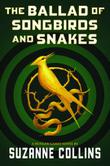Suzanne Collins’ Hunger Games prequel, The Ballad of Songbirds and Snakes, was published on Tuesday, delighting fans of the young adult fantasy series.
Critics, though, were divided in their opinions of the highly anticipated book.
Kirkus gave the novel, which is an origin story for Hunger Games villain Coriolanus Snow, a starred review. “Collins humanizes [Snow] as superficially heroic and emotionally relatable while also using him for a vehicle for philosophical questions,” the reviewer wrote. “Though readers know how he will eventually answer the questions explicitly asked of him, the central question is why, resulting in both a tense, character-driven piece and a cautionary tale.”
 At the New York Times, Sarah Lyall was ambivalent about the book, although she approved of Collins’ decision to focus on the early days of Snow. “Do we want to hear—now, after we know the endgame — that the young Voldemort was unfairly saddled with a demerit in class or that the adolescent Sauron fretted because he had to wear hand-me-down clothes?” she wrote. “Yes, please.” Still, she called the novel “violence porn” and found parts of the book’s final section “flat and desultory.”
At the New York Times, Sarah Lyall was ambivalent about the book, although she approved of Collins’ decision to focus on the early days of Snow. “Do we want to hear—now, after we know the endgame — that the young Voldemort was unfairly saddled with a demerit in class or that the adolescent Sauron fretted because he had to wear hand-me-down clothes?” she wrote. “Yes, please.” Still, she called the novel “violence porn” and found parts of the book’s final section “flat and desultory.”
Philip Womack of the Guardian enjoyed the novel, writing, “Collins’s themes of friendship, betrayal, authority and oppression, as well as the extra layers of lore about mockingjays and Capitol’s history, will please and thrill.”
Entertainment Weekly’s Darren Franich had mixed feelings about the book, calling it both “an undigested lesson plan for the whole Hunger Games idea” and “a major work with major flaws.” He awarded the book a middling grade of B-minus.
Annalisa Quinn of NPR was completely unimpressed, though, panning the book for its “sheer obviousness” and calling it “baggy” and “meandering.”
Readers at Amazon seemed satisfied with Collins’ prequel, however. As of Wednesday morning, the book was the retailer’s No. 1 bestseller and had an average customer rating of four out of five stars.
Michael Schaub is a Texas-based journalist and regular contributor to NPR.































